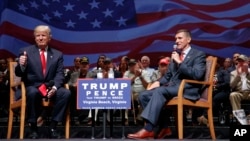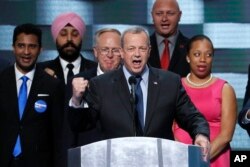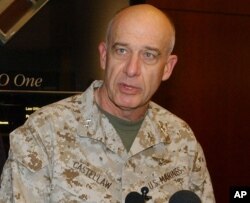At the Republican National Convention in July, retired Lieutenant General Michael Flynn pulled no punches as he gave a speech in support of the party's presidential nominee, Donald Trump.
Flynn criticized President Barack Obama, the commander in chief of the U.S. armed forces, as "weak and spineless." He called Hillary Clinton "reckless" and "crooked."
And when the crowd began screaming for the Democratic nominee to be imprisoned, Flynn joined in. "That's right. Lock her up," said Flynn, a former director of the Defense Intelligence Agency.
While the speech clearly fired up those gathered in Cleveland, some of Flynn's colleagues were not impressed, viewing it as a dangerous politicization of the military.
Retired General Martin Dempsey, a former chairman of the Joint Chiefs of Staff, slammed his former colleague in a letter to The Washington Post days after the speech.
"The American people should not wonder where their military leaders draw the line between military advice and political preference," Dempsey said. He also chastised retired Marine General John Allen, who gave his own passionate speech in defense of Clinton at the Democratic National Convention.
Competing lists
The speeches sparked fresh debate about whether retired senior military officers should become involved in politics. The issue has become even more relevant lately, as both Clinton and Trump roll out long lists of former admirals and generals who endorse their campaigns.
Trump's campaign staff released an open letter this week, signed by 88 former military leaders who said they thought the Republican nominee would oversee a "long-overdue course correction" in U.S. foreign policy.
Not be outdone, Clinton's camp quickly responded with a list of 95 generals and admirals who support her, boasting that her list of endorsements was greater than that of any other recent Democratic nominee for president.
The potential benefits of releasing such lists are obvious: They bolster a candidate's national security credentials and help create the perception that the nation's military leaders support the candidate, not the opponent.
Dividing line
But when military generals become highly partisan cheerleaders for political candidates, does that blur a necessary line between politics and the military? It depends on whom you ask.
Harley Hughes, a retired Air Force lieutenant general, laughed off the question.
"That couldn't be more ridiculous," said Hughes, who signed the letter in support of Trump. In Hughes' view, not speaking out was more dangerous than any theoretical conversation about the relationship between politics and the military.
"The stakes of this election are enormous," Hughes told VOA. "We won't have very many more chances to make mistakes. That's why folks like me speak up."
John Castellaw, a retired Marine lieutenant general who supports Clinton, said he was apolitical during his time in the military, but in retirement, he feels obligated to use his expertise for the good of the country.
"I think it's good for military people [to be involved in politics]," Castellaw said. "We tend to be analytical and methodical. We tend to think about what we are going to do before we take action. Our words in most cases are moderate and measured."
Not illegal
It's not illegal for retired military figures to enter politics. They have the same rights as any other citizen to run for office and to endorse or criticize those who are. Many retired military leaders have themselves run for elected office, even the presidency.
But some have made the argument that officers' responsibilities extend into retirement, not least of all because they continue to be paid by the military and they keep their military ranks.
That's part of what seemed to upset many about Flynn's and Allen's convention speeches: They were introduced as generals and spoke as generals, not simply as "John" or "Mike."
For many ex-military and intelligence officials, that amounts to a violation of a norm they are not so quick to break.
"I don't think it's good for the nation," said Dennis Wilder, who retired in April after serving for over three decades in several senior intelligence and diplomatic roles. "It's the precedent it sets."
"It wasn't appropriate for 37 years, and it's a habit I got into that I'm not getting out of just yet," he told VOA. "The debate on foreign policy should stop at our shores. We shouldn't be criticizing each other overseas. I don't think it's good for the nation."






